
– 3rd November 2019 –
Gospel Text: Luke 19:1-10
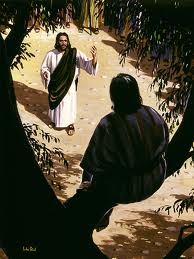 vs.1 Jesus entered Jericho and was going through the town
vs.1 Jesus entered Jericho and was going through the town
vs.2 when a man whose name was Zacchaeus made his appearance; he was one of the senior tax collectors and a wealthy man.
vs.3 He was anxious to see what kind of man Jesus was, but he was too short and could not see him for the crowd;
vs.4 so he ran ahead and climbed a sycamore tree to catch a glimpse of Jesus who was to pass that way.
vs.5 When Jesus reached the spot he looked up and spoke to him:
“Zacchaeus, come down. Hurry, because I must stay at your house today.”
vs.6 And he hurried down and welcomed him joyfully.
vs.7 They all complained when they saw what was happening.
“He has gone to stay at a sinner’s house” they said.
vs.8 But Zacchaeus stood his ground and said to the Lord,
“Look, sir, I am going to give half my property to the poor, and if I have cheated anybody I will pay him back four times the amount.”
vs.9 And Jesus said to him,
“Today salvation has come to this house, because this man too is a son of Abraham;
vs.10 for the Son of Man has come to seek out and save what was lost.”
************************************************
We have four sets of homily notes to choose from.
Please scroll down the page to read them.
Michel DeVerteuil : Michel, a Trinidadian Holy Ghost Priest, Fmr director of the Centre of Biblical renewal .
Thomas O’Loughlin: Thomas is on the theology faculty of Nottingham University
Sean Goan:Sean studied scripture in Rome, Jerusalem and Chicago and teaches at Blackrock College and works now with Le Chéile Schools.
Donal Neary SJ: Donal is editor of The Sacred Heart Messenger
*******************************************************
Michel de Verteuil
Lectio Divina The Year of Luke
www.columba.ie
General Textual comments
This Sunday’s passage tells the story of Jesus’ meeting with Zacchaeus. It is a very touching story, full of character, so deep that we are always finding new things in it, treasures we had not noticed before. God however did not write the story for us to admire St Luke’s extraordinary artistry as a storyteller, but so that we could recognise ourselves in it and discover how he has been and continues to be at work in the world.
There are three characters in the story: Zacchaeus, Jesus, and the complainers. Each of these is a universal symbol; all people and all communities have lived the three stories at one time or another. In your meditation then, you are free to identify with any of them – though not at the same time.
Zacchaeus is the symbol of those who experience that “salvation has come to their house.” The word “house” invites us to recognise that it “comes” to both individuals and communities.
“Salvation” is a word we Christians use frequently but it has become very vague. This is not a happy state of affairs; it means that we have no practical way of evaluating whether we are “saved” or not, and so we can easily deceive ourselves. The Pharisee in last Sunday’s gospel thought he was saved, but was not, and we must be “on our guard” against falling into the same error. The story of Zacchaeus tells us – as always, speaking to our experience – “this is what happens when salvation comes to a house.”
We know from our faith that final and complete “salvation” will “come to our house” only at the end of time. In the course of our lives what we have are temporary and partial experiences of salvation. These are very significant, however, since they
– give us a glimpse of what the final experience will be like (Jesus’ teaching based on experience, as always);
– are a pledge that we will experience it.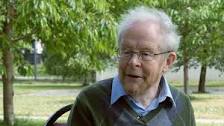
The story of Zacchaeus tells us that “salvation” is an experience of healing and reconciliation, so deep that we exclaim with gratitude in the words of Jesus, “Today salvation has indeed come to this house,” or “Yes, God really seeks out and saves what was lost.”
 As individuals, we remember times when quite unexpectedly we felt accepted and loved
As individuals, we remember times when quite unexpectedly we felt accepted and loved
– by the other members of our family,
– by God in prayer, at a retreat or a Life-in-the-Spirit seminar- by friends,
– by fellow workers in our work place,
– by the other members of our profession.
We felt able – perhaps for the first time – to “stand our ground” and speak up for ourselves, affirming who we were, our past failures and the good deeds we intended to do.
We celebrate “salvation moments” for communities too:
– a local church is converted to the cause of the poor and welcomes them into its inner life, renouncing power and prestige, ignoring the comments of sceptics;
– and ethnic group which had been discriminated against is now fully accepted as part of the community;
– religious groups, enemies up to now, are reconciled and commit themselves to work together;
– on the occasion of a tragedy (e.g. September 11) a nation is warmed by the sympathy of the human family;
– labour and management experience reconciliation in the work place.
The details of the story invite us to retrace the steps which lead to the moment of “salvation”.
a) The tentative start: Zacchaeus was “too short” – he was not up to meeting Jesus as an equal. The “sycamore tree” he climbed was a safe place from which he could peep out; the most he could hope for was to “catch a glimpse” of Jesus.
b) The moment of grace: he experienced Jesus “looking up” at him, and heard those wonderful words, “Come down, hurry, because I must stay at your house today.” This represents the time when we no longer feel isolated; we can invite Jesus (in whatever form we meet him) into our home, not at some time in the vague future but “today”. We feel totally free, do what we have to do without anyone having to tell us. Like Zacchaeus, we are no longer “too short” but can “stand our ground”.
c) “They all complained when they saw what was happening”: how real this is! Salvation is never a simple process, it always has a negative side – a “letting go” of something that was holding us back. We continue to hear voices from the past (parents, teachers, priests, nuns) telling us that we are “sinners”, not good enough to have Jesus stay at our house. Now we hear another voice telling us that they are merely “complaints,” not the truth. God’s truth about us is that we too are “children of Abraham.” We celebrate the Jesus person who said that to us.
Jesus is the symbol of the care-giver, the one who “comes to save what was lost,” “bringing salvation to houses” by inviting the marginalized (communities and individuals) into the mainstream.
Here again we must not allow ourselves to be vague.
We know of many instances where preachers ended up dehumanizing individuals and communities instead of “bringing salvation to their houses.” In this story Jesus teaches us by example, “This is how a Son of Man brings salvation.”
We think of
– parents or grandparents with children who are shy or withdrawn;
– teachers with slow students;
– parish leaders, clerical or lay, with “backsliders”;
– managers with employees who are awkward and are forever doing or saying the wrong thing.
We think too of those who do something similar to groups,  reaching out to those who are alienated;
reaching out to those who are alienated;
– Israelis to Palestinians and Palestinians to Israelis;
– between Catholics and Protestants in Northern Ireland;
– in work places where industrial relations have broken down.
– People working for the environment Donal Dorr, environmentalist
Jesus proceeded in steps, each of which we can identify with and celebrate.
a) He “looked up”. This is very significant; he was “going through the town” but still found time and energy to notice Zacchaeus hiding in the tree.
b) “come down”, meaning “let’s talk as equals.”
c) “Hurry, I must stay at your house today.” The invitation is spontaneous and unconditional; it invites mutuality. There isn’t the slightest trace of condescension. Jesus is saying, “I need your help now.”
d) “Today salvation has come to this house.” Here again no condescension, it is a moment of celebration.
e) “This man too is a son of Abraham.” Jesus makes an “option for the poor”, he consciously and deliberately protects the poor against the “complainers”.
f) The “Son of Man came to save what was lost.” In the light of the above, we can see that he is neither possessive nor condescending; he “saves” by providing the right environment so that Zacchaeus decides of his own accord to be the best he can be.
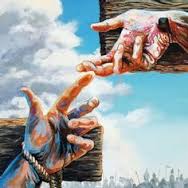 The complainers are ourselves when we are mean and self-righteous. We are like them as individuals; as the Church; as members of a social class, race, ethnic group, or nation.
The complainers are ourselves when we are mean and self-righteous. We are like them as individuals; as the Church; as members of a social class, race, ethnic group, or nation.
This is a story of grace. We are not meant to condemn them but to identify with the journey Jesus is inviting them – and us – to make:
a) The starting point is the “complaint”: “He has gone to stay at a sinner’s house”. The basic problem is personal insecurity, as we know from experience. We can identify two ingredients:
– we cannot bring ourselves to celebrate the blessings enjoyed by those who differ from us, belonging to a different religion, social class, ethnic group or ideological position;
– our thinking is static, we do not allow for growth on the part of those we have categorized as “sinners” – failures in some way.
b) The end of the journey is when we are able to say, “He too is a Son of Abraham.” We celebrate the person (or it could have been an event) who led us along that journey.
How we respond to the story of the complainers will depend on our present situation. We can
– celebrate that we have made the journey as individuals or as a community (thanksgiving),
– become aware that Jesus is calling us to make the journey (repentance),
– recognise that the journey will be very demanding (petition).
Prayer Reflection
“God communicates himself to all persons, redeems them and stamps their being with an orientation towards sharing his life.” …Karl Rahner
Lord, we thank you for the people who have been Jesus for us.
When we felt inadequate, too short maybe !,
so that we could only catch a glimpse of that dream we had for ourselves,
you sent someone who looked up and saw more in us than we ourselves did.
They were not aggressive, didn’t force themselves on us,
just said they were happy to stay in our house.
We felt a surge of joy within us.
We knew that others were calling us sinners, but that didn’t stop us,
we felt free to stand our ground, confess whatever wrong we had done
and commit ourselves to making a new start.
Salvation came to our house that day,
we knew that we too belonged to the family of Abraham
and experienced that you came to seek out and save what was lost.
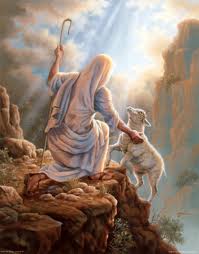 “The most terrible walls are the walls that grow in the mind.” ...Nelson Mandela
“The most terrible walls are the walls that grow in the mind.” ...Nelson Mandela
Lord, we pray that your Church in every country
will be more like Jesus in seeking out those who are lost.
Teach us when we go through our towns to look up and notice
those who like Zacchaeus have made an appearance but hide themselves
because they feel inferior and want merely to catch a glimpse of us.
Teach us to stay with them in their houses and so bring out the best in them
so that they may experience that they too are descendants of Abraham.
“The Word of God is red-hot iron. And you who teach it, you should go picking it up with a pair of tongs lest you burn yourself.” Georges Bernanos, Diary of a Country Priest
Lord, forgive us for when we do not believe in the power of the gospel
to save what was lost.
We have written off people as sinners,
but if we had taken the trouble to stay in their houses
we would have seen salvation come there.
“The captains, merchant bankers, eminent men of letters, distinguished civil servants, chairmen of many committees, industrial lords and petty contractors all go into the dark.” …TS Eliot, The Four Quartets
Lord, we thank you for the artists and poets and Pope Francis who remind us
that we are all sinners
and we can have no grounds for complaint
when we see your saints staying at a sinner’s house.
“Emancipate yourselves from mental slavery. None but yourselves can free your minds.”
Lord, forgive us for preaching salvation in a way that is possessive.
We pray that like Jesus with Zacchaeus
we may assure those to whom we want to bring salvation
that we need their hospitality so that they may stand their ground
and choose freely the way of salvation.
***********************************************
Thomas O’Loughlin,
Liturgical Resources for the Year of Luke
www.Columba.ie
Introduction
Is there a more memorable scene in the whole gospel than that of the little man Zacchaeus climbing a tree to catch a glimpse of Jesus? Then despite Zacchaeus being the outcast in the community, Jesus choosing to have supper with him. The Lord has come among us today, coming to seek and save, and calling us to share his supper now in this sacred banquet. Let us focus our minds on our need to be forgiven, our need to begin afresh, and that we are gathered around the Lord’s table.
Gospel Notes
This story, found only in Luke, brings together several of his major themes in a most memorable incident. Zacchaeus is a marginal Jew, someone on the fringes of society, who is perceived as abandoned by God because of his actions. He is typical of those to whom Jesus says that he is sent in his work of re-gathering the scattered flock and forming the New Israel.
Four themes come together in this reading.
First, there is the theme of the hospitality of God and his acceptance of those who seek him. Jesus calls on the man to be hospitable and then accepts him. Both Zacchaeus and Jesus behave in a God-like way — so distinct from the expectations of those around that they voice their horror — and by so doing they mirror the Father’s love and forgiveness.
Second, Zacchaeus becomes part of the new table fellowship that is centred on Jesus. This new belonging and eating together forms the New Israel where the boundaries are those of welcome for all who seek the Lord and care for all who are in need.
Third, there is the theme of a proper attitude to wealth, which must be seen in the context of care for the poor, and of acting with justice.
Lastly, it is a Son of Abraham who is converted. He is not converted back to what he was or should have been, but is converted to be part of the new people who have accepted the Son of Man.
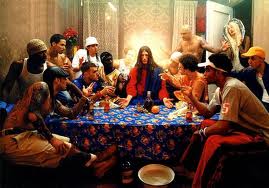 How this story was understood in the late first century is revealed to us in a little detail that is certainly the voice of Luke: ‘Today salvation has come to this house’ — note it is not to this man. This shows that it belongs to the time of the household churches — found in Acts where baptism is often of households — and these households (which cannot be identified with what we call ‘a family’) were the location for the gatherings of the Christians for the eucharistic meal. Therefore, the meal of Jesus and Zacchaeus would have been seen as one in a series of meals of the new people, of which their own Sunday assembly at a eucharistic meal would have been another.
How this story was understood in the late first century is revealed to us in a little detail that is certainly the voice of Luke: ‘Today salvation has come to this house’ — note it is not to this man. This shows that it belongs to the time of the household churches — found in Acts where baptism is often of households — and these households (which cannot be identified with what we call ‘a family’) were the location for the gatherings of the Christians for the eucharistic meal. Therefore, the meal of Jesus and Zacchaeus would have been seen as one in a series of meals of the new people, of which their own Sunday assembly at a eucharistic meal would have been another.
Homily Notes
1. There is a tendency with the story of Zacchaeus to reduce it to such a simple message that we lose sight of what it might show us about God’s love for us. The reduction works like this: Zacchaeus is a sinner, Jesus seeks him out, Zacchaeus repents and has a ‘firm purpose of amendment,’ Jesus forgives him and now one who was lost is saved. This then leads to a practical point: this forgiveness through meeting Jesus is available in the Sacrament of Reconciliation.
So what is wrong with this presentation? After all it has been used in this way in umpteen catechetical programmes. What is wrong with this approach is,
firstly, that when the divine/human encounter is presented in this way it becomes a simple transaction (‘he has what I want and I can do something to get it from him’ – the encounter with a dentist or buying the paper are functionally similar).
Secondly, that message can be taken out of any number of gospel scenes or parables which reduces the richness of the gospels to a series of oft-repeated slogans.
Thirdly, it is driven by its sacramental conclusion. If one starts from the position that the Sacrament of Penance is of great importance, then any gospel story that seems to promote its frequent reception is then seen to be understood if it serves that purpose. However, the task of the preacher of a homily at the Eucharist is to present the good news as it is found in the church’s stories, and preaching on the importance of a particular practice is another matter.
2. There is a central theme of reconciliation in this story, but the key to it lies in its particular context of welcome and acceptance. Moreover, there is no hint that Zacchaeus considered himself a sinner or that he was penitent or contrite. He merely states that he will now be someone who will care for the poor and that if he has cheated anyone, he will repay fourfold.
 3. The starting point is a society that is riven with divisions, riven with injustice, where some are wholly excluded, while others are claiming holiness. It is a scene that is further complicated by people having a sense of being occupied by foreigners, of racial questions as to who have the right bloodlines, and that their religious purity has been compromised. This is the familiar scene of fractured societies where prejudice and bigotry have become substitutes for commitment and faith. What is particularly wrong in this case is that the
3. The starting point is a society that is riven with divisions, riven with injustice, where some are wholly excluded, while others are claiming holiness. It is a scene that is further complicated by people having a sense of being occupied by foreigners, of racial questions as to who have the right bloodlines, and that their religious purity has been compromised. This is the familiar scene of fractured societies where prejudice and bigotry have become substitutes for commitment and faith. What is particularly wrong in this case is that the
society is intended to be a community: they are all children of a single father – Abraham – and they are supposed to be the community of the covenant which bears witness to God’s working in human history.
4. The first act of Jesus is to cut through all the divisions and offer welcome and acceptance to this son of Abraham.
5. Jesus then welcomes Zacchaeus back, not to an abstract notion descriptive of an ideal covenant community (the qahal/ ekklesia of the Lord) but to an actual table fellowship. He is welcomed back into the community and the community can accept his hospitality: a new society is formed around the table of the meal. This new table fellowship is, for Jesus, the coming kingdom of God: in the new mutual acceptance of his table, the transgressions of Israel become past events, a new way of living is begun, and the Father’s home – salvation – is foreshadowed.
6. Zacchaeus can rejoice that the new life of the kingdom had begun and he has been given a place in its banquet, so he too can begin to live life in the new way that is appropriate in the age of the Christ.
7. Jesus’s welcome and acceptance is both the good news and the new life. It is sacramental – but not in terms of the Sacrament of Reconciliation – because sharing in his table both establishes the new covenant and anticipates the life to come; and it is in terms of that sacramentality of the Lord’s table fellowship that we gather for the Eucharist.
8. If there is to be a practical challenge at the end of the homily it might go like this:
*******************************************
Sean Goan
Let the Reader understand
www.Columba.ie
Gospel Notes
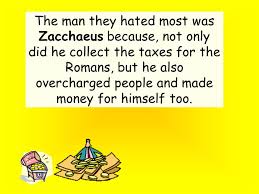 Again this Sunday a tax collector plays an important role in the gospel story. This time, however, he is not a character in a parable but a real life person whose experience of Jesus changes him and causes consternation among those who know him. Zacchaeus would have been well known in the Jericho area because as a tax collector he was considered a collaborator with the occupying Roman forces. He would have bought the right to collect taxes there and probably would not have been too scrupulous about how he made his profit. Because of his stature he was also possibly a figure of ridicule. Imagine then the surprise of the people of Jericho as Zacchaeus is the one Jesus speaks to and it is to his house that Jesus goes. Once again in Luke the themes of repentance and forgiveness are linked to the refusal of the so-called virtuous to celebrate this man’s return to the fold.
Again this Sunday a tax collector plays an important role in the gospel story. This time, however, he is not a character in a parable but a real life person whose experience of Jesus changes him and causes consternation among those who know him. Zacchaeus would have been well known in the Jericho area because as a tax collector he was considered a collaborator with the occupying Roman forces. He would have bought the right to collect taxes there and probably would not have been too scrupulous about how he made his profit. Because of his stature he was also possibly a figure of ridicule. Imagine then the surprise of the people of Jericho as Zacchaeus is the one Jesus speaks to and it is to his house that Jesus goes. Once again in Luke the themes of repentance and forgiveness are linked to the refusal of the so-called virtuous to celebrate this man’s return to the fold.
Reflection
 An interesting feature of biblical history is the extent to which problems are caused not by the godless sinners but by religious zealots of various kinds. The story of Zacchaeus is a joyful one but most of the witnesses, who are probably fervent and devout people, don’t see it that way. Instead they complain. The troubles in Thessalonica were probably stirred up by the lunatic fringe there and Paul is called upon to offer some balance and help them focus on the essentials. This should serve as a kind of warning to us. We need to be careful about what drives our religious fervour and so ensure that we are not hindering the spread of the gospel by our self righteousness or our dogmatism.
An interesting feature of biblical history is the extent to which problems are caused not by the godless sinners but by religious zealots of various kinds. The story of Zacchaeus is a joyful one but most of the witnesses, who are probably fervent and devout people, don’t see it that way. Instead they complain. The troubles in Thessalonica were probably stirred up by the lunatic fringe there and Paul is called upon to offer some balance and help them focus on the essentials. This should serve as a kind of warning to us. We need to be careful about what drives our religious fervour and so ensure that we are not hindering the spread of the gospel by our self righteousness or our dogmatism.
***************************************
Donal Neary SJ
Church Reflections, Year C
www.messenger.ie/bookshop/
Made to belong and to share
In the presence of Jesus, Zacchaeus, the little man with a big story, found out who he, really was and, what he was made for. That’s the way it is with Jesus.
His big story wasn’t impressive. The whole town knew of his corruption, and his exploitation, Many could tell a story of being diddled by him into paying more tax than was just. He carried this burden all the time and somehow the arrival of Jesus impelled him to climb a tree so that his life would be changed. Our stories are all a mixture of good and evil. We carry burdens of guilt and sin and hurt and anger. We need to get free and be the self we can be.

Zaccheus found he wasn’t the mean person he had been showing all his life. He found that restoration of ill-gotten gains, and a promise to help his neighbour, would bring more happiness than his past. He found in meeting Jesus the acceptance that allowed him to change, to go public on his change, and to continue a changed life no matter what others thought.
He was made for community, belonging and sharing; not for isolation, loneliness and greed. He knew now he was made for love for he found himself loved by God in Jesus, so that the one everyone was talking about visited his house now.
It didn’t make Jesus popular. They blamed him for going to the house of someone like that. It’s often like that; we would like Jesus to look down on the ones we look down on. The only time Jesus looks down on us is from his cross – to raise us up to the heights of love and humanity we are made for.
Lord Jesus we are made in your image;
help us to live in your likeness.